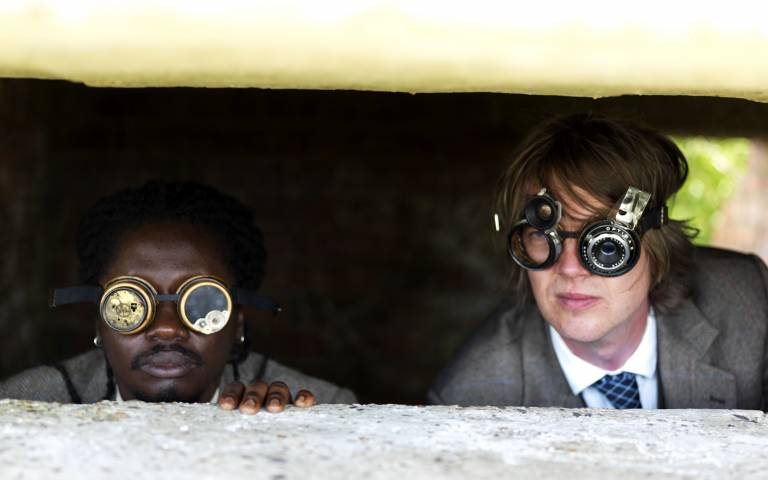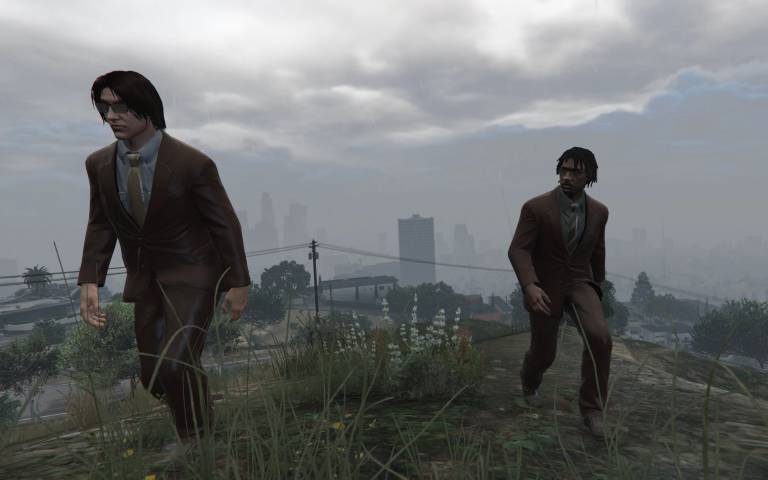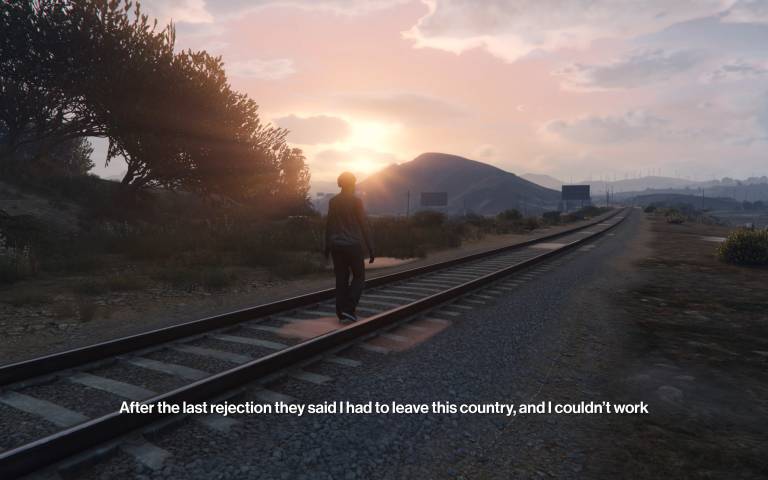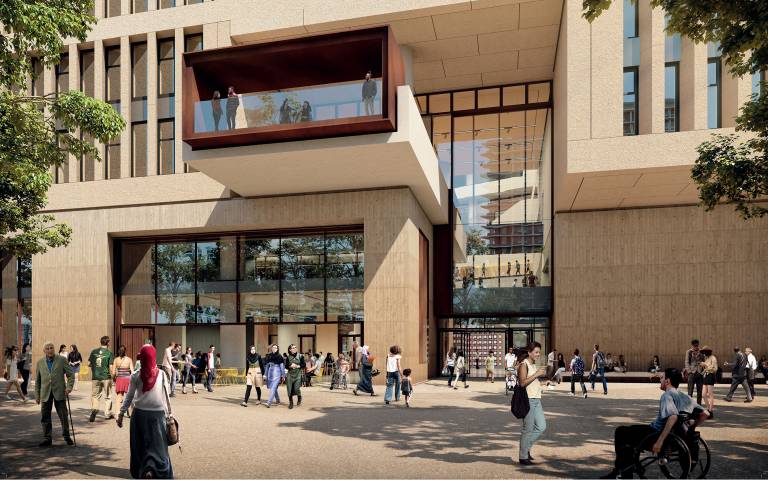Slade alumni to create 'science fiction mothership' at UCL East
19 March 2021
Two internationally respected artists – both UCL alumni from London - have been chosen to create cutting-edge public art for the university’s new campus in the Queen Elizabeth Olympic Park, UCL East.

Larry Achiampong and David Blandy, renowned for their work involving gaming, videos and sculpture, will jointly produce permanent artwork for the campus’s Marshgate building, due to open in September 2023.
The campus will bring together researchers, students, creatives, local communities and industry to solve some of the biggest challenges affecting people’s lives and the planet. Marshgate is one of two new state-of-the-art buildings in development.
Drawing on their existing collaborative work that shares stories of communal and personal heritage, the duo are aiming to ‘create a work that reimagines Marshgate itself as a science fiction mothership.’
The artists, who studied at UCL Slade School of Fine Art, were selected through a competitive interview process, led by Head of Public Art Sam Wilkinson and the UCL East Public Art Committee.
UCL is one of the few UK universities to have adopted a university-wide public art policy, empowering artists to stimulate interdisciplinary relationships and contribute to the wider understanding of the work of the university, its place in London and the global challenges that UCL research addresses.

At PRAKSIS in Oslo, for their work FF Gaiden: Delete, Achiampong and Blandy worked with migrants from the organisation Mennisker i Limbo (People in Limbo) to create a complex tapestry of stories of identity and migration, cultural history and social change.
They produced a series of videos combining conversations with participants around contemporary identity, thoughts about how their relationships and identities are formed through the virtual world, and an original, synth-driven soundtrack.
Larry, who studied a Master’s in Sculpture at UCL Slade School of Fine Art in 2008, said: “We’re going to create an archive of stories, an artwork that is grounded, real and human; formed of the dreams of the life of the building, revealing the inner lives of the people who inhabit the infrastructure during both the day and night.
“Through our research around the site we will examine play’s centrality to creativity and selfhood, how this inspires research and growth in fields as diverse as engineering, robotics, AI and art.
“Through this process we will create new work that expands our investigations into anthropology and science fiction, offering visions that question what a better world might look, feel and sound like.”

David, who studied a Master’s in Fine Art Media at UCL Slade School of Fine Art in 2003, added: “These mythologies will be both collected, through extensive research into cultures from across the world reflected in the local area, and created, through collaboration with the huge range of users of the building, from local communities and research scientists through to artists and fabricators. We will create a work that reimagines Marshgate itself as a science fiction mothership.
“Our practice is collaborative, and we love to invite others into that conversation, building stories together to imagine different possibilities and examine the world around us. Through conversations, writing together and building virtual spaces together, we’ve worked with multiple communities to give a space for people to make self-portraits inside the computer space.”
Achiampong and Blandy’s work has been shown in the UK and abroad, with past solo exhibitions and performances at the Tate Modern; BFI London Film Festival; Arts Catalyst, London; Iniva, London; The Baltic, Gateshead; Yorkshire Sculpture Park, Wakefield; FACT, Liverpool; Plymouth Arts Centre; National Gallery of the Bahamas, Nassau; Fort Worth Contemporary Arts, Texas; Stony Island Arts Bank, Chicago and PRAKSIS, Oslo, Norway.
The UCL East Public Art Programme represents an important part of the university’s support for artist-in-residency activities, artist-academic research partnerships and a commitment to engaging with local communities in a variety of ways.
Last year, east London artist and Slade lecturer Emma Hart was appointed to create artwork for the primary public entrance of the East campus’ Pool Street West building.
Professor Paola Lettieri, Director of UCL East, said: “We are delighted Larry and David will create this important artwork. They were chosen due to their innovative approach to telling people’s stories and how keen they are to engage with complex local communities who can be poorly represented.
“Exploring key issues such as intolerance and immigration, David and Larry have developed a fantastic artistic practice breaking the boundaries between the creative disciplines – which is true to the interdisciplinary ethos we are embedding at UCL East.”

Marshgate will house activities across areas as diverse as manufacturing, advanced propulsion, artificial intelligence, mobility, disability, planetary sustainability, wellbeing, urbanisation, finance, business, art and culture.
At its heart is a central atrium open to the public, to encourage inclusivity, collaboration and community engagement.
From design and media studios to fabrication workshops and object-based learning spaces, the building will foster collaboration and promote learning by doing.
UCL is one of the founding partners of East Bank - one of the world’s largest and most ambitious culture and education districts. It was established to deliver the regeneration promised by the 2012 Olympics and fellow partners include V&A, Sadler's Wells, BBC and UAL's London College of Fashion.
Links
- David Blandy's website
- Larry Achiampong's website
- UCL East
- UCL Slade School of Fine Art
- UCL Faculty of Arts & Humanities
- Resulting artwork: Trēow of Time, 2023
Images
- Finding Fanon, Larry Achiampong and David Blandy, photography by Claire Barrett, 2015
- Finding Fanon 2, Larry Achiampong and David Blandy, 2016
- FF Gaiden: Delete, Larry Achiampong and David Blandy
- Entrance to Marshgate building, UCL East
Media contact
Sophie Vinter
Tel: +44 (0)20 3108 7787
Email: s.vinter [at] ucl.ac.uk
 Close
Close

